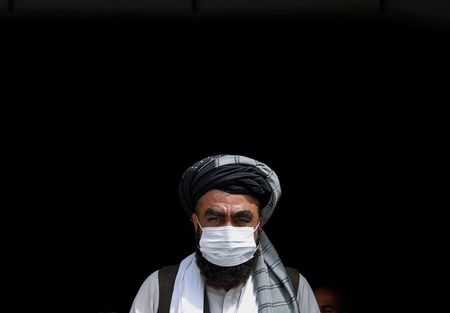By Hameed Farzad
KABUL (Reuters) – Just a few weeks ago, Marzia Sikandar served burgers and rice from her solar-powered mobile cart in Kabul, but now, wearing a protective suit, she distributes masks and offers free soap and water in the Afghan capital to combat the coronavirus outbreak.
Her converted carbon-neutral rickshaw is one of around 40 owned by social enterprise Banu’s Kitchen which had until recently employed women to sell food and support their families in Afghanistan’s conservative society, but has now been transformed into mobile sanitising stations in a country where many are without running water or easy access to health services.
“Of course I’m so worried about this virus, especially when I’m outside and when I get back home, I’m afraid that the virus will spread to my children, though I take precautions. But I’m delighted that I can help my compatriots and the country,” said Sikandar, 45, who distributes up to 70 masks a day.
Afghanistan’s total number of coronavirus cases was at more than 1,200 on Friday with 40 deaths, and officials and experts have cautioned the number could rise far higher given limited testing and the country’s weak health infrastructure.
At one stop in the locked-down capital, Sikandar’s fellow disinfection worker was on hand to help space out people who had queued up to get their hands washed, while her husband, Mohammad Anwar, sanitised a policeman’s rifle and hosed down nearby cars with disinfectant.
They are among roughly 80 women and men thrust to the forefront of fighting COVID-19 after the government provided the funds to Banu’s Kitchen to convert the food carts into these mobile disinfectant vehicles.
“Afghanistan is one of the poorest countries in the world, and most of the population cannot afford the sanitising product, which have higher prices,” said Farhad Wajdi, who founded Banu’s Kitchen in 2018.
“Our mission is to reach these underprivileged families, these impaired families who cannot afford to buy sanitising products.”
But he hopes that eventually things will return to normal and Banu’s Kitchen’s female workers can return to selling food.
“We hope to see the end of the coronavirus, so we can convert these disinfecting carts back to the Zero-Carbon food carts.”
(Reporting by Hameed Farzad; Writing by Charlotte Greenfield; Editing by Muralikumar Anantharaman)


